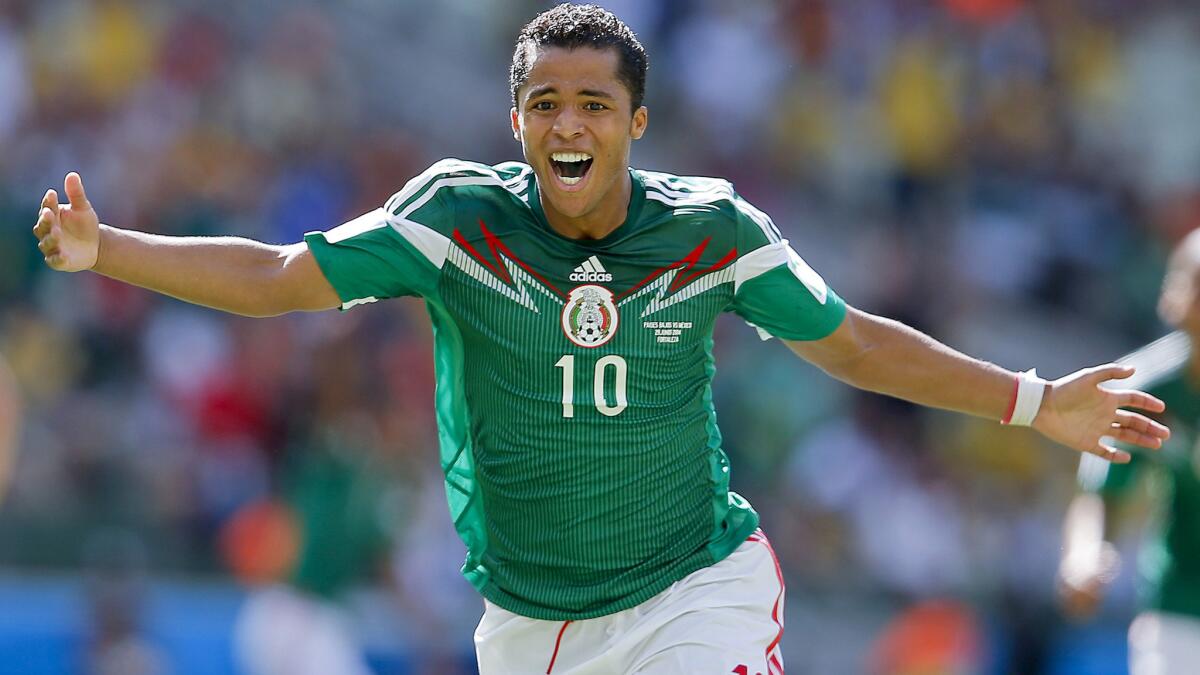With Giovani Dos Santos, Galaxy may finally win over more Latino fans

Mexico midfielder Giovani dos Santos celebrates after scoring against the Netherlands in the second round of the World Cup on June 29, 2014, in Fortaleza, Brazil.
Gustavo Ortiz’s family had a seemingly can’t-miss business plan — a Mexican restaurant near the Carson home of the five-time MLS champion L.A. Galaxy. It was the ideal marriage of the Mexican American community and its high interest in soccer.
Only it wasn’t working. Mexican Americans weren’t that interested in the Galaxy — until now.
Hours after the team’s signing of Mexican national team player Giovani Dos Santos, the Galaxy’s telephone lines were filled with people wanting to buy tickets. The excitement was equally as high at Ortiz’s restaurant.
“Dos Santos is the real deal,” Ortiz said. “The real Mexican. We all love Giovani Dos Santos.”
Love is not a word Mexican Americans have typically used about the Galaxy. It’s why the signing of Dos Santos, a flashy 26-year-old in the prime of his career, could be among the most significant in the 20-year history of Major League Soccer. It counters the widespread perception that MLS is the last stop for top-flight international players looking for a soft landing on their way to retirement.
It could be even more significant for the Galaxy, whose mostly white, suburban fan base has traditionally had little representation from Southern California’s largest and more passionate soccer supporters: Latinos.
The Galaxy has focused much of its attention on importing aging, big-name stars such as David Beckham, Robbie Keane and most recently Steven Gerrard from the English Premier League. It has paid off with three league titles in four seasons, but the average attendance has declined by nearly 2,000 a game since 2012.
Dos Santos figures to change that, and the decision is as much about off the field as on. In 2018, the Galaxy will be competing for fans with the Los Angeles Football Club, which is strategically building a stadium in the diverse area downtown that currently houses the Sports Arena.
If the Galaxy can capture Latino fans before then, it would hinder LAFC’s ability to develop a supporter base of its own. Dos Santos’ contract is the second-longest in club history, extending through two seasons after LAFC’s debut.
The signing is also the most expensive in franchise history. The Galaxy paid at least $7 million in transfer fees to Dos Santos’ former team, Villarreal. Details of the 41/2 -year contract have not been made public, but it is expected to compare favorably to the $6-million annual salary the Galaxy is paying Gerrard, making it at least a $34-million deal.
The league even had to adopt new salary guidelines so that the Galaxy could sign Dos Santos.
Until last week, teams were allowed to carry three “designated players,” whose contracts counted only partially against the league salary cap. On the Galaxy, those spots are held by Gerrard, Keane, who is the league’s current most valuable player, and U.S. national team defender Omar Gonzalez.
The new rules allow teams to use special “allocation money” to pay down other salaries, creating a new slot to sign another player at a higher salary.
“I don’t think it’s straight-across easy, that if he shows up [Latinos] will come,” said Josh Guesman, the producer of the fan podcast Corner of the Galaxy and a season-ticket holder since 2008. “It’s all about Gio wanting to play the game. He has to show up.”
Dos Santos has a well-earned reputation of being a player whose focus on soccer can quickly lapse, a dangerous situation in a city filled with as many temptations as Los Angeles. It’s one reason he’s played for seven teams in nine years.
“He has to decide he wants to play,” Guesman said. “Otherwise, it’s going to be an unmitigated disaster.”
Outside Southern California, fans of the Mexican national team are also divided over the move. Some are eager to see him play in MLS so they can watch him in person while others wonder about the effect it will have on Dos Santos’ future.
“It’s a step in the wrong direction,” said Sergio Tristan, founder of Pancho Villa’s Army, the largest U.S.-based supporter group for the Mexican national team. “Not because it’s the MLS but because he is leaving Europe [where the competition is much better].
“I wouldn’t want him to come back to [Mexico] either. Not now. Not in his prime.”
Former national team star Claudio Suarez, who finished his career in MLS with Chivas USA, said Mexican fans should get used to the idea of seeing their favorite players in the U.S. Salaries in Mexico’s domestic league once dwarfed those in MLS, but now top players can make more in the U.S. and be closer to home than in Europe and safer than playing in Mexico.
“It’s very hard to say no to a team like the L.A. Galaxy,” Suarez said. “At the moment, there are a lot of quality players that prefer coming to the U.S. MLS keeps evolving, keeps growing. ...
“Things are changing, the salaries keep increasing and the lifestyle keeps getting better.
“I tell them, ‘Now you want to come?’ ”







